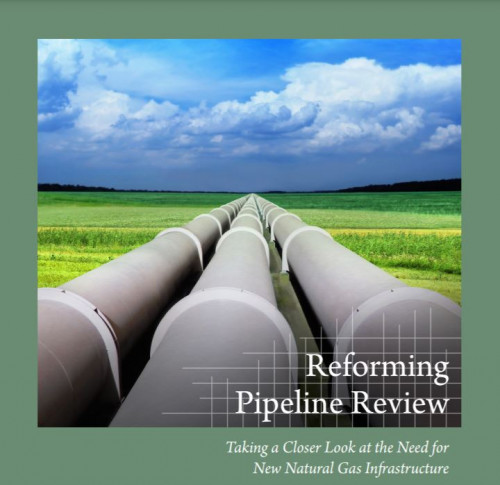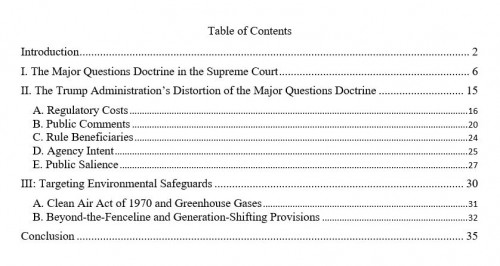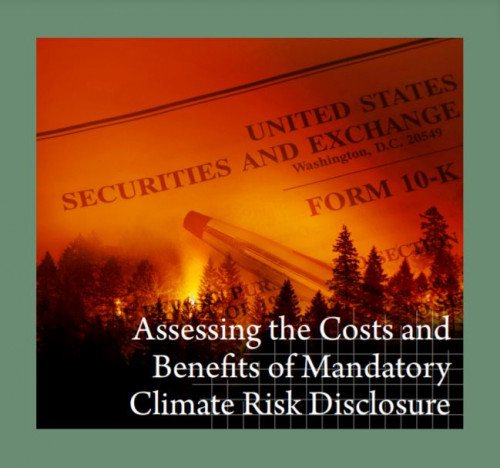-
Comments to OCC on Draft Principles for Climate-Related Financial Risk Management for Large Banks
The Office of the Comptroller of the Currency (OCC) has issued Draft Principles for Climate-Related Financial Risk Management for Large Banks. Along with partner organizations, we submitted comments supporting the OCC's Draft Principles and offering potential next steps for the OCC.
-
Reforming Pipeline Review
Taking a Closer Look at the Need for New Natural Gas Infrastructure
The Federal Energy Regulatory Commission (FERC) uses a flawed process to evaluate the need for new, long-lasting gas infrastructure such as interstate pipelines, resulting in a certification process that fails to serve the public interest. As FERC begins to re-examine its approval process for new natural gas infrastructure, our report analyzes the Commission’s authority to consider a broader range of factors when deciding whether a proposed project is in the public interest. The report offers four key recommendations for reform.
-
Mangling the Major Questions Doctrine
Published in Administrative Law Review
The Trump Administration construed the major questions doctrine enormously expansively and inconsistently, in ways untethered to the Court’s jurisprudence, turning it into little more than an invitation for courts to strike down regulations the Administration did not favor for policy-based reasons. Under the similarly wrongheaded and even broader arguments made by the Administration’s allies, all greenhouse gas regulations could be suspect on major question grounds. Bringing to light these argument's enormously problematic application of the doctrine is important to foreclose their successful revival in future administrations.
-
Comments to EPA on Oil and Gas Sector Methane Standards
In November 2021, EPA proposed standards to regulate methane emissions from new and existing sources in the oil and natural gas sector. Policy Integrity submitted comments supporting the proposed standards, and recommending that EPA strengthen its proposal by regulating additional leaky sources; conducting a distributional analysis of the rule's expected impacts; extending the time frame of its analysis; quantifying co-benefits; and disaggregating costs and benefits to demonstrate that its proposed standards are both individually and cumulatively net beneficial.
We also submitted joint comments with a coalition of other environmental groups on EPA's use of the social cost of greenhouse gases (SC-GHG) in its proposed regulation, recommending that the agency expand its justification of its discount rates and inclusion of global damages in the SC-GHG, and affirm that the SC-GHG is a lower bound of projected climate impacts.
-
Comments to FHWA on EV Charging Infrastructure
The new Bipartisan Infrastructure Law establishes two funding programs through the Federal Highway Administration (FHWA) to invest in the deployment of electric vehicle (EV) charging infrastructure. In November, FHWA issued a request for information to shape forthcoming guidance for these programs and emphasized its interest in information on how the guidance could incorporate equity considerations. Policy Integrity submitted comments recommending steps that FHWA and applicants to these funding programs can take to rigorously consider the distributional effects of proposed EV charging infrastructure and factor those effects into ultimate grantmaking decisions. Our comments also recommend that FHWA require applicants to promote robust stakeholder engagement while funding proposals are being developed.
-
Joint Comments to DOE on Energy Efficiency Standard for Lightbulbs
Together with partner groups, we submitted joint comments to the Department of Energy (DOE) on it proposed energy efficiency standard for general service lamps (i.e. lightbulbs). Our comments applaud DOE for using the social cost of greenhouse gases (SC-GHGs) in analyzing the proposed rule, but encourage the agency to expand upon its rationale for adopting a global damages valuation and for the range of discount rates it applies to climate effects. We further recommend that DOE disclose the SC-GHG estimates that it applies after 2050.
-
Amicus Brief in Supreme Court Case Over Regulation of Greenhouse Gas Emissions from Power Plants
Certain coal companies and states have asked the Supreme Court to narrow the scope of EPA’s authority by prohibiting the agency's use of flexible compliance mechanisms—like intersource emissions trading and production shifting—in regulating greenhouse gas emissions from the power sector. The challengers rely in part on the major questions doctrine, a little-used canon of interpretation that petitioners claim bars EPA from issuing costly and controversial rules.
In this amicus brief, we explain that petitioners’ application of the major questions doctrine would expand the canon beyond either recognition or workability, stretching a doctrine meant to apply only in rare cases to cover many different regulations advanced by administrations of both parties. We further explain that, contrary to petitioners’ assertions as part of their major questions analysis, EPA has frequently relied on flexible compliance mechanisms under numerous Clean Air Act provisions. Finally, our brief argues that Section 111(d) of the Clean Air Act is an integral statutory provision for regulating air pollution and not an afterthought as petitioners contend.
The Supreme Court will hear the case, West Virginia v. Environmental Protection Agency, later this term. The case seeks to revive the Affordable Clean Energy Rule, a deregulatory action promulgated under the Trump administration that was vacated last year by the U.S. Court of Appeals for the D.C. Circuit.
-
Testimony in House Natural Resources Hearing on Gulf of Mexico Oil and Gas Leasing
On January 20, 2022 the Subcommittee on Energy and Mineral Resources hosted a remote oversight hearing titled, “What More Gulf of Mexico Oil and Gas Leasing Means for Achieving U.S. Climate Targets.” Witnesses included Policy Integrity's Max Sarinsky, whose full testimony is available here. Watch the hearing recording here.
-
Assessing the Costs and Benefits of Mandatory Climate Risk Disclosure
Climate impacts are already threatening major economic sectors in novel ways and could cost the global economy trillions of dollars annually by 2100. Yet despite their serious implications, climate-related financial risks are under-disclosed by companies and are rarely reported in a way that is useful for investors.
As the Securities and Exchange Commission (SEC) prepares a new climate risk disclosure rule, this report analyzes relevant case law and highlights best practices that the SEC can follow in estimating the rule’s economic impacts. With trade groups expected to challenge any new disclosure requirement by claiming that its costs exceed its benefits, defending the rule’s economic analysis will be crucial in court.
-
Comments to FAR Council on Considering Climate in Federal Procurement
Together with several environmental nonprofits, we filed comments supporting the Federal Acquisition Regulatory Council's emphasis on climate-sensitive procurement. We endorse using the social cost of greenhouse gases in procurement decisions and suggest rigorous ways for agencies to incorporate those figures into their analyses of different bids and proposals.
Viewing recent projects in Climate and Energy Policy










